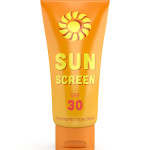 Spray-On Sunscreens Are Flammable, According to Product Recall
Spray-On Sunscreens Are Flammable, According to Product Recall
Most people apply sunscreen to avoid getting burned by the sun. However, a product recall issued from both the Food and Drug Administration, as well as the manufacturer, says that spray-on sunscreens can burn consumers in other ways – because they’re flammable.
Many spray-on sunscreens, including Banana Boat sunscreen, use alcohol or other flammable ingredients so the product can be used as an aerosol. Particles can stay in the air after application, hovering over the consumer. So, when a consumer sprays on the sunscreen, then stands too near a fire or flame, the person can, according to five recorded incidents, catch fire.
One victim – Brett Sigworth of Massachusets – last year sprayed on some of the recalled Banana Boat sunscreen, then went to tend his grill. Suddenly, he caught on fire.
“I’ve never experienced pain like that in my life,” he told CBS News.
The burns he received were in the exact spots that were sprayed with the spray-on sunscreen.
Banana Boat addressed the incident in a statement to CBS Boston, saying: “We were concerned to hear about Brett’s experience. At Banana Boat, we take these matters very seriously and will begin a prompt investigation as we continue to strive to deliver products of the highest quality to our consumers.”
Another woman in Norfolk, VA, reportedly used the spray-on sunscreen, waited several minutes for it to set, then went to use her welding torch. “My whole arm went on fire,” she told reporters.
Last fall, Energizer Holdings, which is the manufacturer of Banana Boat sunscreen, issued a product recall for the spray-on version. According to their product recall notice, the problem appears to be the spray valve, which “dispenses more than is typical in the industry for continuous sun care sprays.”
A spokeswoman for the company said that the valve had been redesigned to release less spray, and new products began shipping last November. However, the FDA still cautions consumers not to use the products near open flames, because of the chemical makeup of spray-on sunscreens.
“Based on this information, we recommend that after you have applied a sunscreen spray labeled as flammable, you consider avoiding being near an open flame, sparks or an ignition source,” says Narayan Nair, M.D., a lead medical officer at FDA.
Sunscreen is still an important part of safety in the summer. If you are outdoors, you should apply sunscreen to avoid regular skin damage and burns from extended sun exposure, as well as skin cancer later in life.
The Strom Law Firm Can Help with Cases Involving Spray-On Sunscreen
Defective products make it to the market for a variety of reasons, and it is important that consumers are aware that they have recourse against manufacturers. Often, these defective products are inadequately tested, or are misrepresented by marketers. Defective products can have manufacturing or design flaws or defects, and if they are improperly tested then these problems will go unnoticed until consumers begin to complain.
If you or a loved one have used spray-on sunscreen which then ignited without warning, you may have a personal injury case. Too many consumers were harmed by spray-on sunscreens before a product recall was issued. The attorneys at the Strom Law Firm can help. We offer free, confidential consultations to discuss the facts of your case. Do not hesitate to contact us regarding personal injury cases. 803.252.4800

